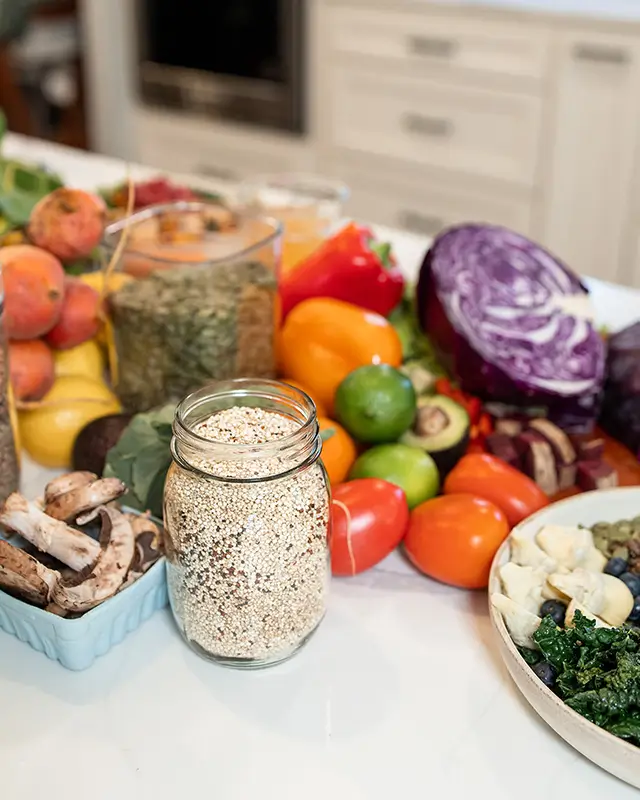Antibiotics are powerful tools in fighting bacterial infections, but their widespread use has led to growing concerns about their impact on gut health and overall immunity. While antibiotics can be lifesaving, they often act indiscriminately, wiping out not just harmful bacteria but also the beneficial microbes in your gut that play a crucial role in maintaining health. This disruption of your gut’s delicate ecosystem, or microbiome, can lead to digestive issues, a weakened immune system, and even longer-term health consequences.
In this blog, we’ll explore how repeated antibiotic use can alter your gut microbiome, increase susceptibility to infections, and affect your mental health through the gut-brain connection. We’ll also cover practical strategies to support gut health, including the role of prebiotics and probiotics, and tips to prevent unnecessary antibiotic use. Whether you’re recovering from a course of antibiotics or looking to protect your immune system, understanding how these medications affect your gut is key to staying healthy.
Impact of Repeated Antibiotic Use on Gut Health
Disruption of the Microbiome
Antibiotics are designed to kill harmful bacteria, but they don’t always distinguish between the “bad” bacteria causing infections and the “good” bacteria that live in our gut. Imagine your gut microbiota as a busy parking lot, where each parking space represents an opportunity for bacteria to thrive. Normally, the spaces are filled with beneficial bacteria that help digest food, produce vitamins, and support your immune system. When antibiotics are used, they don’t just clear out the “bad” bacteria, they also empty some of those spots taken by the “good” bacteria. This leaves more parking spaces open and available for unwanted bacteria to “park” and overgrow. This imbalance, known as dysbiosis, can impair your gut health and weaken your immune system, leaving you more susceptible to infections down the road.
Long-term Effects
The consequences of repeated antibiotic use can be far-reaching. Over time, a disrupted microbiome may increase the risk of gastrointestinal issues like bloating, diarrhea, or even more serious conditions such as Clostridium difficile (C. diff) infections. The effects aren’t just limited to your gut—because of the gut-brain connection, dysbiosis can also impact mental health, potentially leading to mood changes, anxiety, or depression.
Restoring Gut Health
After finishing a course of antibiotics, it’s essential to focus on restoring balance in your gut. Just as it takes time for a parking lot to fill back up with cars, repopulating your gut with good bacteria can’t happen overnight. Incorporating probiotic-rich foods like yogurt, kefir, or fermented vegetables, along with prebiotics (which act as food for the good bacteria), can help replenish your gut’s beneficial microbes. Probiotic supplements might also be helpful, but it’s important to choose the right strains and doses depending on your individual needs.
Strategies to Prevent Antibiotic Use
While antibiotics are sometimes essential for treating bacterial infections, reducing the need for them in the first place is even better for long-term health. By supporting the immune system through simple lifestyle and dietary strategies, you can lower your risk of infections that might require antibiotics. Here are a few key preventive measures:
Nutrient-Dense Diet
A well-rounded, nutrient-rich diet is the cornerstone of a strong immune system. Focus on whole foods that are high in vitamins, minerals, and antioxidants to fuel your body’s natural defense mechanisms. Foods rich in vitamin C, zinc, and antioxidants, like fruits, vegetables, nuts, and seeds, help maintain immunity. A steady intake of prebiotic and probiotic-rich foods (such as sauerkraut, yogurt, kefir, and fermented veggies) can also support your gut health, which plays a crucial role in immune function. Additionally, avoiding blood sugar spikes by managing carbohydrate intake can help keep your immune system balanced. When blood sugar is constantly fluctuating, it can lead to inflammation and immune dysregulation, making your body more susceptible to illness. Plan to eat meals with plenty of protein, fat and fiber to encourage blood sugar stability.
Hygiene Practices
Good hygiene is one of the simplest ways to prevent infections. Regular handwashing is incredibly effective at stopping the spread of harmful bacteria and viruses, especially during cold and flu season. However, be mindful not to overuse antibacterial soaps and sanitizers, as these can strip your skin of beneficial microbes and lead to antimicrobial resistance. You don’t want to “kill” everything; maintaining a balance is key, as some bacteria are essential for keeping our immune system functioning optimally.
Stress Management
Chronic stress can weaken the immune system, making it harder for your body to fight off infections. Finding ways to manage stress through mindfulness practices, deep breathing, or engaging in hobbies can significantly reduce your risk of illness. Sleep is another critical component—your body needs adequate rest to repair and rejuvenate its defenses. Make sure you’re getting 7-9 hours of quality sleep each night, and balancing physical movement with periods of rest. Regular exercise is great for immunity, but too much without adequate recovery can have the opposite effect, leaving you more vulnerable to getting sick.
When to Use Antibiotics
It’s important to know when antibiotics are actually necessary. They’re effective for treating bacterial infections, such as strep throat or urinary tract infections, but are completely ineffective against viral illnesses like the common cold, flu, or most cases of bronchitis. If you’re unsure, consult your healthcare provider to confirm whether antibiotics are appropriate for your situation. Overuse of antibiotics not only disrupts your gut microbiome, but it can also lead to antibiotic resistance, making future infections harder to treat.
Consult Healthcare Providers
If you find yourself getting sick frequently, it’s worth investigating why. Repeated illnesses may signal underlying issues like gut imbalances, nutrient deficiencies, or low secretory IgA (a marker of gut immune function). Working with a healthcare provider to explore these root causes can provide you with more targeted strategies for long-term health. It’s also important to discuss alternatives to antibiotics, when possible, as well as supportive treatments for gut health if antibiotics are needed. Open communication with your healthcare provider can help prevent unnecessary antibiotic use while ensuring you get the right treatment when it’s needed.
Prebiotics and Probiotics to Support the Immune System
Supporting Immune Health with Prebiotics
Incorporating prebiotic-rich foods into your diet is an effective way to nourish your gut and, in turn, bolster your immune system. By feeding beneficial bacteria, prebiotics help maintain a balanced gut microbiome, regulate inflammation, and enhance your body’s ability to fight off infections. Consider adding foods like garlic, onions, chicory root, bananas, and asparagus to your meals, or consider adding in a prebiotic supplements that could support your unique health needs. This is beneficial whether you are on antibiotics, just recently got off antibiotics OR trying to prevent getting sick and taking antibiotics.
Prebiotics to Support the Immune System
Prebiotics are non-digestible fibers that serve as food for beneficial bacteria in the gut, helping them thrive and maintain a balanced microbiome. A well-fed gut microbiome not only supports digestive health but also plays a critical role in modulating the immune system. Several prebiotic fibers have been studied for their ability to enhance immunity and reduce the risk of infections.
Fructooligosaccharides (FOS)
Fructooligosaccharides (FOS) are short-chain carbohydrates that act as a food source for beneficial bacteria, particularly Bifidobacteria and Lactobacilli. Studies have shown that FOS can increase the production of beneficial short-chain fatty acids (SCFAs) like butyrate, which play a key role in regulating immune function. Butyrate has anti-inflammatory properties and helps strengthen the gut barrier, preventing harmful pathogens from entering the bloodstream. Consider adding some of these foods to your diet to increase FOS: Chicory root, Onions, Garlic, Leeks, Asparagus, Bananas, Jerusalem artichokes, & Dandelion greens.
Immune Benefits:
Research suggests that FOS supplementation can enhance the activity of natural killer (NK) cells, a type of white blood cell that is crucial for fighting off viral infections. Additionally, FOS has been shown to support the production of immune-stimulating cytokines, which are essential for a robust immune response .
Inulin
Inulin is a well-researched prebiotic fiber that promotes the growth of Bifidobacteria in the gut. Like FOS, inulin fermentation leads to the production of SCFAs, which help regulate immune responses and reduce inflammation in the body. Inulin is naturally found in foods like chicory root, garlic, onions, and asparagus.
Immune Benefits:
Several studies have demonstrated that inulin can enhance both gut and systemic immunity. One study found that inulin supplementation increased the levels of beneficial Bifidobacteria in the gut and improved immune markers in the elderly, a population with typically weaker immune responses . Another study reported that inulin reduced the incidence of respiratory infections, indicating its potential role in preventing common illnesses .
Galactooligosaccharides (GOS)
Galactooligosaccharides (GOS) are another class of prebiotics that have been extensively studied for their immune-supporting properties. GOS selectively stimulates the growth of Bifidobacteria and helps reduce the presence of pathogenic bacteria like Clostridium difficile and Escherichia coli. By promoting the growth of beneficial bacteria, GOS helps modulate the immune system and support gut integrity. Consider adding these foods to your diet to increase GOS: Legumes (e.g., lentils, chickpeas, kidney beans), Green peas, Soybeans and soy products (e.g., tofu, tempeh), Beetroot, Dairy products (especially in small amounts in cow’s milk and yogurt)
Immune Benefits:
Research has shown that GOS can improve immune function in both adults and infants. A clinical trial found that GOS supplementation reduced the severity and duration of colds in healthy adults . Additionally, GOS may help reduce the risk of allergies by improving gut barrier function and lowering systemic inflammation .
Arabinogalactan
Arabinogalactan is a polysaccharide found in plants like larch trees and echinacea. It is known for its immune-enhancing properties, as it can stimulate the production of immune cells like macrophages and NK cells. Arabinogalactan also acts as a prebiotic by increasing levels of Lactobacilli and Bifidobacteria in the gut, supporting overall microbial balance. Consider adding these foods to your diet to increase intake of Arabinogalactan: Echinacea (commonly found in immune-boosting teas and supplements), Carrots, Radishes, Tomatoes & Coconut meat.
Immune Benefits:
A study on arabinogalactan found that it enhanced the body’s immune response to viral infections by increasing the activity of NK cells and macrophages . It may also help reduce the duration of colds and respiratory infections by supporting both innate and adaptive immune responses.
Resistant Starch
Resistant starch is a type of prebiotic that escapes digestion in the small intestine and ferments in the colon, feeding beneficial bacteria like Bifidobacteria. Found in foods like green bananas, oats, and cooled potatoes, resistant starch has been shown to promote SCFA production, particularly butyrate, which supports both gut health and immune function. Consider adding cooked and cooled starch to your diet to increase your resistant starch intake (examples include: cooked and cooled rice, cooked and cooled potatoes, cooked and cooled pasta).
And yes, when you reheat these foods, they do maintain their resistant starch content if they have previously been cooled all the way.
Immune Benefits:
Resistant starch has been linked to improved immune responses by enhancing the gut barrier and reducing inflammation. One study showed that resistant starch supplementation improved gut immunity and decreased inflammation markers in individuals with metabolic syndrome, suggesting its potential benefits for overall immune health .
Recommended Probiotic Strains for Immune Support
Probiotics play a critical role in maintaining a healthy gut and supporting the immune system. Certain strains of beneficial bacteria have been studied for their ability to boost immunity, reduce the duration of illnesses, and promote gut health. Below are some of the most researched probiotic strains for immune support, along with their benefits and recommended product options.
1. Lactobacillus rhamnosus GG
Benefits:
Lactobacillus rhamnosus GG (LGG) is one of the most studied probiotic strains for its immune-boosting properties. Research shows that LGG can help prevent and reduce the duration of respiratory infections, particularly in children and individuals with weakened immune systems. This strain also supports gut health by promoting a balanced gut microbiota and enhancing immune responses.
Brands:
- Culturelle® Digestive Health Probiotic – One of the most well-known supplements containing Lactobacillus rhamnosus GG. It’s widely recommended for supporting immune health and gut function.
- Renew Life® Ultimate Flora Probiotic – Another popular brand offering high-quality formulations with LGG for digestive and immune support.
2. Lactobacillus plantarum
Benefits:
Lactobacillus plantarum is known for its ability to strengthen the gut barrier, helping to reduce gut permeability (often referred to as “leaky gut”). By maintaining gut barrier integrity, it reduces inflammation and promotes immune function. This strain is also beneficial for reducing symptoms of IBS and enhancing overall digestive health, which in turn supports the immune system.
Brands:
- Garden of Life® Dr. Formulated Once Daily Ultra – Contains Lactobacillus plantarum along with other immune-supporting strains for comprehensive gut health.
- Jarrow Formulas® Ideal Bowel Support 299v – Features a specific strain of L. plantarum (299v), known for its benefits in maintaining digestive and immune health.
3. Bifidobacterium animalis subsp. lactis
Benefits:
Bifidobacterium animalis subsp. lactis has been shown to boost immune responses, especially in children. It helps enhance the body’s defenses by increasing natural killer (NK) cell activity and reducing the frequency of respiratory infections. This strain is particularly effective in maintaining a healthy balance of bacteria in the gut, which is crucial for a well-functioning immune system.
Brands:
- Align® Probiotic Supplement – Contains the Bifidobacterium animalis subsp. lactis strain and is often recommended for digestive health and immune support.
- NOW® Probiotic-10 – Offers a blend of probiotics including Bifidobacterium animalis subsp. lactis to support immune function and digestive balance.
4. Lactobacillus acidophilus
Benefits:
Lactobacillus acidophilus is one of the most common probiotic strains, frequently found in yogurt and fermented dairy products. It helps balance the gut flora and supports both digestive health and immune function. This strain is particularly effective in promoting a healthy gut environment, which plays a direct role in enhancing the body’s immune defenses.
Brands:
- Garden of Life® RAW Probiotics Women/ Men – Includes Lactobacillus acidophilus along with a variety of other probiotics for both digestive and immune health.
- Klaire Labs® Ther-Biotic Complete – Features a multi-strain probiotic formula with L. acidophilus to support gut health and immunity.
5. Bifidobacterium bifidum
Benefits:
Bifidobacterium bifidum is another important strain that supports the gut lining and enhances immune responses. It plays a key role in maintaining a healthy gut microbiome by aiding in the breakdown of fiber and producing short-chain fatty acids (SCFAs), which help reduce inflammation and support immune function.
Brands:
- Pure Encapsulations® Probiotic 50B – Offers a high-potency formula with Bifidobacterium bifidum to support gut and immune health.
- Life Extension® FLORASSIST® GI with Phage Technology – Contains B. bifidum, known for supporting gut integrity and immunity.
6. Saccharomyces boulardii
Benefits:
Saccharomyces boulardii is a beneficial yeast that has been widely studied for its ability to prevent antibiotic-associated diarrhea and support overall gut health. This strain has immune-modulating effects and helps maintain the intestinal barrier, reducing inflammation and supporting the body’s defenses against pathogens.
Brands:
- Florastor® Daily Probiotic Supplement – One of the most well-known Saccharomyces boulardii supplements, frequently recommended for digestive health and immune support, especially during or after antibiotic use.
- Jarrow Formulas® Saccharomyces Boulardii + MOS – Contains Saccharomyces boulardii, offering immune support and protection from gut disturbances, especially during antibiotic treatments.
Incorporating Probiotics for Immune Health
Including these probiotic strains in your daily routine can provide significant immune support by promoting gut health and enhancing the body’s natural defenses. Whether you’re recovering from antibiotics, boosting your immunity during cold and flu season, or supporting overall well-being, these strains have shown benefits in both research and clinical practice. When selecting a probiotic, consider choosing a reputable brand that provides strains studied for their immune benefits and consult with your healthcare provider if necessary.
Want to have some probiotics on hand for your immune system? You can search and order any of the probiotics listed above on Fullscript (you must make an account first in order to order).
Medical disclaimer: Before trying anything new, please consult your healthcare provider.
Curious about how to choose a probiotic? Check out this blog post that talks about the difference between live & active cultures vs. spore based probiotics








